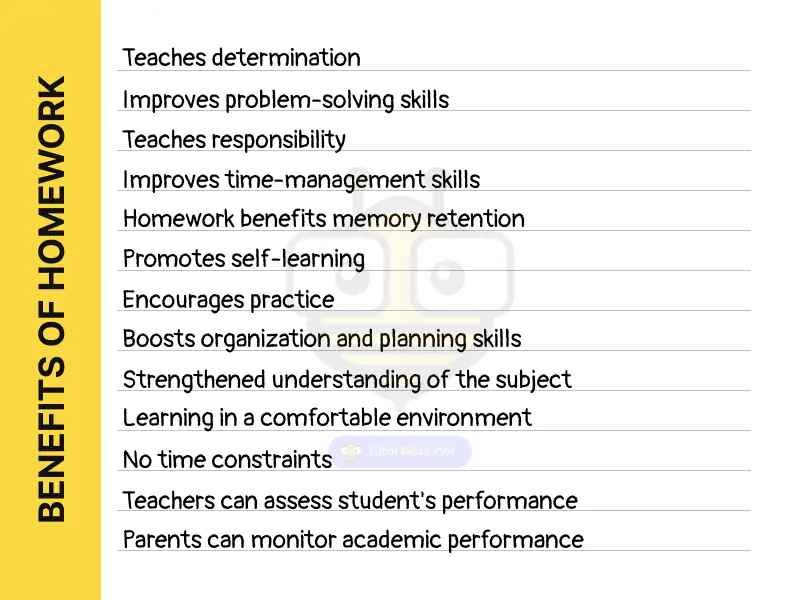We never liked homework. It caused perplexion and gave us jitters! But did you know that homework has been practised as far back as in the 1st century CE? The great orator Pliny the Younger asked his followers to participate in-home activities. This practice was adopted by monks and philosophers and continued throughout the Middle Ages and the Enlightenment era. [1]
Advantages of Homework
Homework can be incredibly beneficial for students. Research by Duke University Psychology Professor indicated a positive correlation between homework and student achievement.
[2] It helps reinforce what has been taught in class, promotes independent learning, improves time management, and encourages responsibility.
By regularly completing homework, students develop critical thinking skills and build a strong foundation for academic success.
Homework enhances study habits, nurtures positive attitudes toward school, and boosts self-restraint, curiosity, and problem-solving skills.
Let us unravel some of the critical benefits of homework for kids in detail.

Benefits of doing homework
Teaches determination
Homework can cause students to be distracted or beset by problems at home, and these issues have to be resolved independently. It teaches them the determination not to give up and overcome any challenges they might face. Hence, doing homework is a great way to enhance perseverance and determination.
Improves problem-solving skills
Kids can also sharpen their problem-solving skills by doing homework. If they encounter any problems while doing their assignments, they will have to tackle them without the assistance of a teacher. They will determine the issues and solve them according to their mental abilities, which will sharpen their problem-solving skills.
Teaches responsibility
Homework provides excellent means to instill responsibility in kids. Students will be intuitively encouraged to take education seriously by doing homework regularly. Moreover, they will finish the assignments and solve problems independently. It will instill responsibility in them, which will help them at school and later in their professional career.

Improves time-management skills
Time management is essential when it comes to homework. Schedules should be prepped up to ensure all assignments are completed before deadlines. It engineers a sense of responsibility in kids to effectively plan and manage time. Therefore, doing homework can teach your kids some practical time management skills.
Homework benefits memory retention
Homework is a great way to boost your child’s memory retention. Kids will recollect the concepts and topics taught in the classroom, enabling them to memorize key facts and figures. It will yield fruitful benefits in the form of improving memory and enhancing focus.
Promotes self-learning
Homework also promotes self-learning in students as they need to review their work and revise the lessons. It can be a crucial benefit as self-learning eventually improves academic performance.
Encourages practice
If students encounter problems, they need to repeat and tackle the issues. This method encourages practice. By completing homework for a complex subject daily, kids are equipped with a better understanding of the subject, also honing their practicing skills. It will aid their educational performance and help them in various career paths.
Boosts organization and planning skills
Attempting homework also furbishes your child’s organizational skills. Doing assignments means that a methodical approach has to be followed. It includes – advanced planning, doing research, following guidelines, and jotting down notes. It can only be achieved if children exercise organization and planning skills, and learning these skills will benefit them throughout their lives.
Strengthened understanding of the subject
Doing homework also unravels and simplifies complex concepts and terminologies, making the learning experience more productive. Likewise, students who enjoy doing homework displayed a better understanding of the subject than those who evaded homework.

Learning in a comfortable environment
Though classrooms have considerably evolved over the years, providing kids with a convenient and stimulating environment. Nevertheless, standard classrooms can still overwhelm kids, impacting their education. In this case, the comfort of a home offers them a great respite to continue their education by doing homework.
No time constraints
Homework also enables students to complete their learning process without any time constraints. The time allocation for each period ranges from 30 to 60 minutes, which can also inhibit the learning process. Hence, by doing assignments at home, students can counter the negative impact of time constraints and substantively improve their learning.
Teachers can assess student’s performance
Homework provides a window of opportunity for teachers to assess students’ performance. If they discover that any student faces complexities regarding any concepts and topics, they can focus on them. In addition, teachers can also alter their teaching methods and adopt suitable techniques.
Suggested Read: Qualities of a Good Teacher
Parents can monitor academic performance
Doing homework is beneficial for kids, and it also gives parents a chance to learn and evaluate their academic performance. Additionally, parents can also offer assistance in solving problems that kids might face.
Read More: Things that kill brain cells

Conclusion
No matter how much kids dislike homework, it manifests profuse benefits. Students who complete homework attain better academic performance and become proficient in real-world skills that can help them later in life. However, as the old proverb says, ‘excess of everything is bad,’ homework is no different. Teachers should not overburden their students with homework. And instead, they should adopt a proportionate approach and make it more enjoyable.
More Suggested Reads:
How to Improve Spoken English?
Online Extracurricular Activities for Kids
Why Do Kids Need To Learn Coding?
References:
[1] “Who Invented Homework and Why Was It Invented?” Through Education.
[2] “Is Homework Good for Kids? Here’s What the Research Says.” Time.




